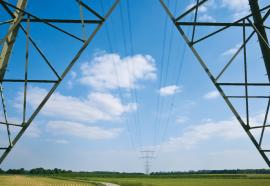The Coming Conflict
Predicting discord in power plant property tax assessments.
At a time when many states and municipalities are facing budget deficits of historic proportions, many power generators are struggling against declining demand, the lowest electricity prices in many years, and looming carbon legislation. As a result, tax authorities might be seeking to raise property tax receipts at the exact same time that many generators are looking to lower their assessments. Conflict appears to be on the horizon, but where will it emerge? An examination of state budgets, as well as the expected changes in generator gross margins, reveals how tax collectors and taxpayers are most likely to respond.
Real Green Costs
Valuing risk reduction for renewables and DSM.
Resource planners are faced with complex choices for developing cost-effective and robust energy supply portfolios. These choices are complicated by uncertainties inherent in future fuel and emissions costs. In the summer of 2008, retail energy providers with supply primarily from wind generation had a substantial cost advantage over gas-fired generation. In the summer of 2009, though, gas prices plummeted in the wake of the recession. Reversing the previous trend, this shift causes wind generation to appear more costly relative to gas-fired generation.
Changing the Game
Why did Michigan cap competition?
The sweeping regulatory reform implemented in Michigan over the past year is often couched as a response to the economic crisis. Decoupling rates from utility profits, the reasoning goes, will remove disincentives to efficiency. Reducing the subsidies that commercial customers have long shouldered will ease their financial burdens. New renewable portfolio standards and wind generation initiatives will create green jobs and much-needed infrastructure.
Outsmarting the Grid
A trio of eager tech startups confronts an industry intent on preserving the status quo.
In light of all the excitement created by smart-grid regulatory initiatives and stimulus funding, three clever tech startups have come forward with proposals for novel grid projects. In California, Western Grid Development proposes to install energy storage devices ranging in size from 10 to 50 MW at various discrete and strategic locations in PG&E’s service territory where the California ISO has identified reliability problems. Second, a company called Primary Power proposes to deploy a total of four advanced, 500-MVAR static VAR compensators (SVC) at three separate locations within the PJM footprint. Third, in Clovis, N.M., Tres Amigas plans to allow power producers to move market-relevant quantities of electric power and energy between and among the nation’s three asynchronous transmission grids: ERCOT and the Eastern and Western Interconnections.
Tomorrow's T&D
The most economical energy savings might be found in grid efficiency.
Power delivery efficiency gains constitute a valuable utility asset that can offset or defer new generation and T&D investments. Enabling technologies, utility demonstration projects and supporting regulatory frameworks are needed to validate potential savings.
Smart Grid Consensus
Workable standards require utility input.
The IEEE P2030 Work Group is developing standards to encourage seamless deployment, integration and operation of energy, information and communication technologies across the smart grid. Utility input and engagement is needed to produce workable standards.
Engaging Customers
Look to other industries for lessons on marketing services.
To get the most from smart-grid investments, utilities need to target customers most likely to participate in smart-grid programs. The new business case requires a new marketing strategy—and a new level of regulatory scrutiny.
Smart-Grid Roadblocks
Strategies for surviving the industry’s transition.
To realize the full potential of smart-grid benefits, utilities must undergo significant changes. They must learn to integrate information and operations differently, demonstrate adaptability and modify cultural tendencies.
Transactions
(February 2010)






